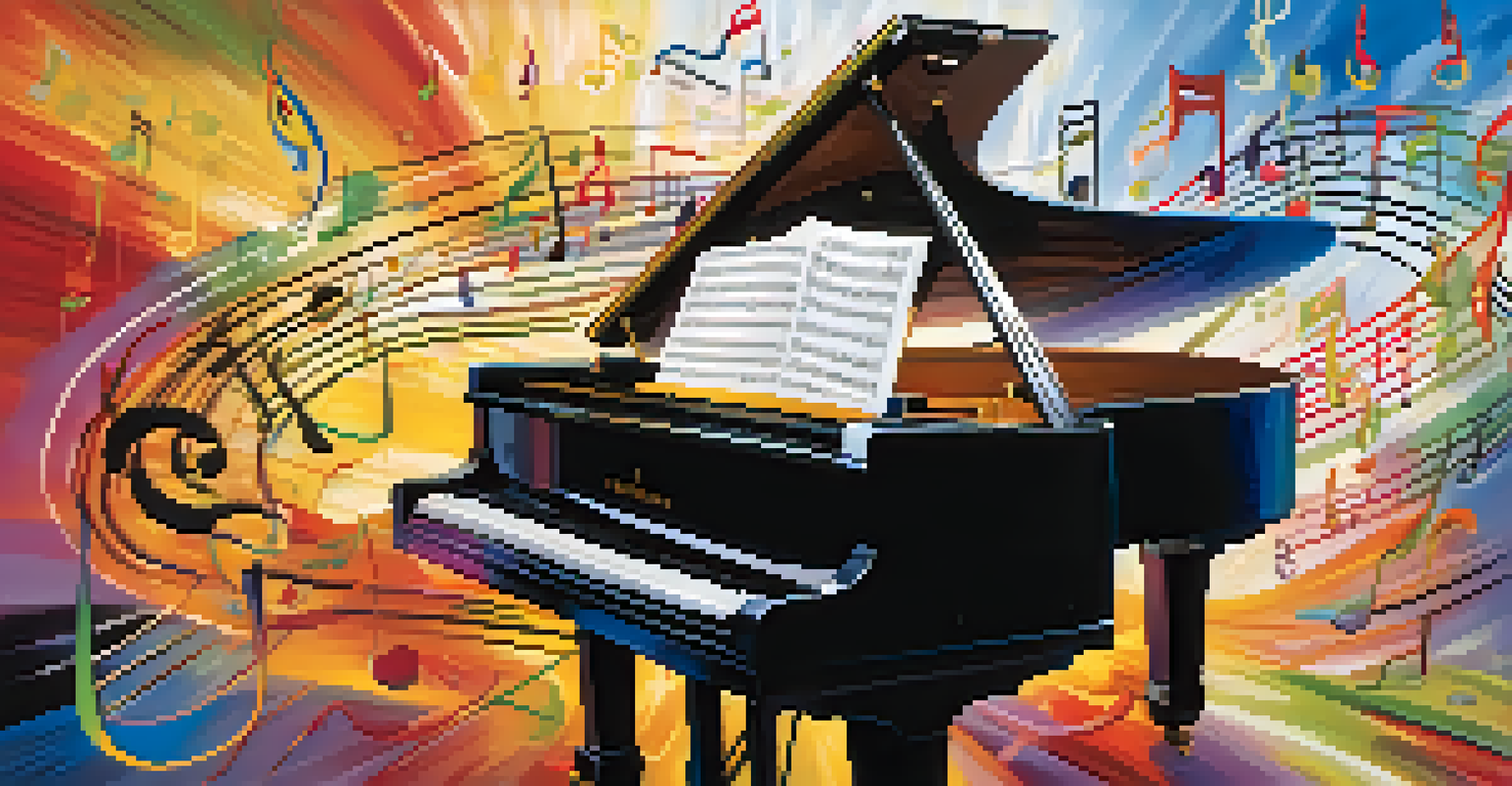The Role of a Music Notator: Skills and Responsibilities

What is a Music Notator and Their Importance in Music?
A music notator is a specialized professional who transcribes music into written notation. This can include everything from simple melodies to complex orchestral scores. Their work is crucial in preserving musical compositions and making them accessible for musicians to perform.
Music is the shorthand of emotion.
Think of a music notator as a bridge between the composer’s ideas and the performers’ understanding. By translating sounds into symbols, they provide the necessary roadmap for musicians. Without their expertise, many musical works would remain unplayable or lost to time.
In the world of music, where interpretation can vary dramatically, a clear and accurate score is essential. Music notators ensure that the nuances of a piece are captured, allowing musicians to deliver performances that honor the original intent of the composer.
Key Skills Required for a Successful Music Notator
To excel as a music notator, one must possess a strong understanding of music theory and notation. This foundational knowledge allows them to accurately interpret and transcribe music. Familiarity with different musical styles and genres is also essential, as each may have unique notational conventions.

Additionally, attention to detail is paramount in this role. A single wrong note or misaligned rhythm can alter the entire performance. Music notators often spend hours perfecting a score, ensuring every element is precisely represented.
Role of Music Notators Explained
Music notators transcribe and refine compositions, ensuring that musical works are accurately represented for performers.
Moreover, proficiency in various music notation software tools can significantly enhance a notator's efficiency. Programs like Sibelius or Finale allow for more complex arrangements and faster transcription, enabling music notators to keep up with the demands of modern music.
The Responsibilities of a Music Notator Explained
The primary responsibility of a music notator is to convert audio or written compositions into standardized sheet music. This involves listening to recordings, analyzing scores, and meticulously writing down the notes, dynamics, and articulations.
Without music, life would be a mistake.
In addition to transcription, music notators often collaborate with composers to refine their scores. This partnership can lead to adjustments and improvements that enhance the clarity and performance of the piece. Their insights can help composers understand how their music will be interpreted by performers.
Moreover, music notators frequently proofread and edit scores for accuracy. This process is vital to ensure that the music is error-free and ready for distribution to musicians, recording studios, or publishers, thereby playing a key role in the music production pipeline.
The Creative Side of Music Notation
While music notation may seem technical, it also involves a fair amount of creativity. Notators must interpret the composer’s intentions and decide the most effective way to represent them on paper. This requires a deep understanding of musical expression and stylistic nuances.
For instance, deciding how to notate a crescendo or the use of specific articulations can dramatically affect a performance. Music notators have the opportunity to add their own artistic touch when interpreting a piece, making their role not just about replication but also about enhancement.
Skills Essential for Notators
A strong grasp of music theory, attention to detail, and proficiency in notation software are crucial for success in this role.
This creative aspect often leads to a collaborative environment where notators work closely with performers to ensure the music is both playable and expressive. Their ability to fuse technical skill with artistic insight is what makes their contributions invaluable.
Challenges Faced by Music Notators
Despite the rewarding nature of the job, music notators face several challenges. One primary issue is dealing with unclear or poorly recorded music. When working from audio, they must decipher nuances that may be lost in a rough recording, which can be quite a daunting task.
Another challenge is the rapid pace of music production today. With the demand for new compositions increasing, notators often find themselves juggling multiple projects simultaneously. This can lead to stress and a potential decrease in the quality of their work if not managed well.
Additionally, as music evolves with technology, notators must continuously adapt to new methods and tools. Staying updated with the latest software and notation practices is essential, ensuring they remain competitive in a continuously changing industry.
The Role of Technology in Music Notation
Technology has profoundly impacted the field of music notation, making the process faster and more efficient. Music notation software allows notators to create, edit, and share scores with ease. This ease of use has not only streamlined the transcription process but also enhanced collaboration between notators and musicians.
Moreover, digital platforms enable music notators to access a vast library of scores and resources. This connectivity allows them to draw inspiration and reference from a wide array of musical works, enhancing their own transcription efforts.
Impact of Technology on Notation
Advancements in technology are streamlining music notation processes while also requiring notators to adapt to new tools and trends.
However, while technology provides many advantages, it also requires notators to be tech-savvy. Understanding how to navigate software challenges is vital, as a lack of familiarity can hinder productivity and creativity in their work.
Future Trends in Music Notation
The future of music notation is set to evolve as technology continues to advance. AI and machine learning are beginning to play a role in transcription processes, potentially aiding notators in their work. These tools could help automate some aspects of notation, allowing notators to focus on more complex tasks.
Additionally, as music consumption shifts further into digital spaces, the demand for interactive scores is likely to rise. This trend will push notators to explore new formats, such as animated scores or interactive apps that enhance the musician's experience.

Ultimately, the role of the music notator will remain essential, even as trends change. Their unique blend of creativity and technical skill will continue to be a cornerstone in the music industry, ensuring that compositions are preserved and performed accurately.